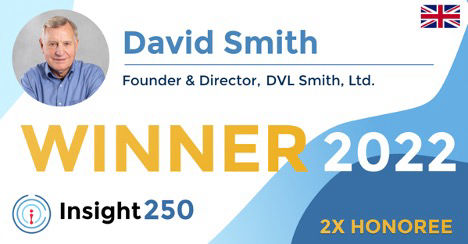Excellence, rigour, and creativity
Insight professionals’ productivity and ability to deliver excellence, rigour, and creativity, whilst working to tight deadlines and within demanding budget constraints.

The Insight250 spotlights and celebrates 250 of the world’s premier leaders and innovators in market research, consumer insights, and data-driven marketing. The inaugural list was revealed in April 2021 (and the latest 2022 winners were announced at ESOMAR Congress in Toronto last September), creating renewed excitement across the industry whilst strengthening the connectivity of the market research community.
With so many exceptional professionals named to the Insight250, it seems fitting to tap into their expertise and unique perspectives across various topics. This weekly series does just that; inquiring about the expert perspectives of many of these individuals in a series of short topical features.
This edition features David Smith, Founder and Director of DVL Smith, Ltd. David and I discuss insight professionals' productivity and ability to deliver excellence, rigour, and creativity, whilst working to tight deadlines and within demanding budget constraints.
David, can we start by defining excellence and also by clarifying what we mean by being a productive, high performer?
“Top insight professionals have plumbed into their DNA the drive to always go that extra intellectual mile to find better and/or different ways of doing things. Their natural curiosity and forensic mental energy drive them to reach out to that place of excellence to fully realise new possibilities and deliver this to their clients and stakeholders.
“On the subject of high productivity, this is about having the discipline of always relentlessly focusing on what matters most and consistently acting with purpose and intentionality to achieve the desired end outcomes. Each day is about making a difference that adds value rather than completing various activities. It’s about never letting the process kill the big creative idea.”
David Smith
Is there evidence that market researchers are better than other sectors or professions in being high performers in consistently delivering excellence together with high productivity over and above the norm?
“The evidence is only anecdotal, but I've often been frustrated at their slow pace when I have worked outside the insight industry with various other professionals. I kept thinking to myself, if only I could work with my fellow insight professionals, we could get this cracked in a few weeks rather than it taking months.
“Reflecting on this, I think there are three reasons why insight professionals are in the vanguard of high performance, getting quality work out of the door at speed and within budget.
“First, we are project orientated. Everything we do has a clear beginning, middle, and end. We are comfortable working to milestones and deadlines.
“Second, as an industry, we tend towards growth, not fixed mindset. If you look at the 75-year-plus history of market research, you'll see a willingness to accept, not be resistant to, change.
“We've acquired an undeserved reputation as being crusty old traditionalists working in the backroom. This does not do justice to how we've successfully adapted to changes in society, technology, and our understanding of the human experience.
And most importantly, so many insight professionals embrace the entrepreneurial way of working. Academics call this ‘effectual reasoning.’ It's about quickly getting projects underway in the face of imperfect information and uncertainty and then course-correcting en route. We're naturally aligned with this agile way of thinking – the ‘build the plane as you fly it’ approach to getting things done.”
David Smith
So you're saying we've excelled at offering better, cheaper, and faster. But will we be able to keep this recipe going in perpetuity? Surely there are limits.
“Yes, we have done well, but I think there are three watch outs going forward:
“First, over the years, we've shifted from a focus on the classic - valid, reliable, and generalisable - research evidence into a more pragmatic world of providing fit-to-purpose solutions.
“There's nothing wrong with this pragmatism. If you can solve a problem at the 85% quality level for half the price in a few weeks, why not go for this option?
“But the danger is reaching a point where we begin to deceive ourselves about the quality of the evidence being delivered. As the pressures grow to cut costs and time, we start suspending disbelief about what this is doing for quality.
“There is a slippery slope towards not being fully transparent about the implications of this loss in quality. And the end result could be to make decisions based on critically flawed evidence.
“The second concern is the danger of ‘shiny object syndrome’ kicking in and dominating our approach. By this, we start convincing ourselves that technical wizardry alone is all we need to throw up powerful insights.
“We manage to persuade ourselves that we no longer have to put in the hard yards of clear deep thinking, reflection, rumination, and that constant agonising as we circle around deciding what the most creative solution to the challenge in front of us is.
“We start convincing ourselves that we can abandon all this brain hurt and intellectual endeavour that characterises the insight professional’s role and get ChatGPT to do it instead!
“And, building on the above, we will need to hold the line when it comes to factoring into the project process sufficient ‘elapsed time’. We might be able to do a 24-hour analysis and feedback turnaround, but this rarely allows for the creative juices to fully engage.
“Stephen King, in discussing creative writing, talks about letting the subconscious do its work. He refers to letting the boys and girls in the basement do their job overnight or over several nights.
“So, we need to constantly remind ourselves that insights aren't just found with a shiny tool, but created in a fierce strategic dialogue between the insight professionals, informed stakeholders, and the evidence - this all takes time.”
David Smith
What advice do you have for the next generation of insight professionals when it comes to delivering powerful insights timely against tight budgets?
“There are three pillars to my answer. The first is to ensure that you're operating from the right strategic standpoint. It's difficult to get paid for the value you're providing if you're tactically trying to retrieve a flawed strategic position. Hard work and endeavour alone won't do it.
“So, you don't want to get trapped into the generalist box with no differentiating characteristics around which you can promote the value you're providing. In this way, you'll always be pushed around and asked to do more for less at breakneck speed.
“The aim should be to position yourself as the trusted go-to advisor - the person who can be the wide angle lens of the organisation - and to quote Isaiah Berlin, ‘Will have that acute sense of what fits with what, what springs from what, and what leads to what’. You will be the one who can play music with the evidence, relate this to the organisation's strategy, and help the C-suite navigate uncertainty.
“The second is to work at improving your personal productivity. This is about cultivating an organised mind, becoming the creative problem solver who knows how to crystallise and simplify, not confuse problems. It’s also about being as an energy radiator, not an energy drain. Be the linchpin who knows how to make things happen and create order from any emerging chaos.
“This is a big topic I cover in my upcoming book, The Entrepreneur Mindset: The Art of Making Ideas Happen’.
“But here are three specific tips: cultivate the habit of focusing on what matters most and acting purposefully to deliver these big-ticket outcomes. It's about not just sleepwalking through the day, but staying focused on how you could provide added value that clients are prepared to pay for.
“Apparently, the founder of IKEA used to ask himself the following question every 15 minutes ‘Is what I'm about to do next contributing to building the IKEA empire?’. This is a bit excessive and obsessive, but you get the idea!
“Next, you need to protect yourself from what Julia Cameron in her book about fostering creativity - ‘The Artist’s Way’ - calls the ‘crazy makers’. These are the time thieves and energy robbers who deflect you from achieving your purpose for the day.
“So, don’t let your inbox drive your agenda. You must take control, get key actions in the calendar and protect your space. One technique I use is to employ the 90-minute block time principle. At the start of each day, I protect myself from outside interruptions for 90 minutes and focus exclusively on the major task – the ‘big rock’ - that needs tackling that day. Medium rocks and pebbles can wait!
“Also, you must learn the art of being a starter-finisher, avoiding procrastination and perfectionism. One way to get started is the ‘Where there's a way, there's a will’ technique. Always make a start - get that first sentence written. This initial progress will motivate and sustain you and help you get to the end goal you're striving for.
“Attention to detail is crucial in the Insight industry. But you must also learn to ‘laugh in the face of perfection’ and not let the quest for an ideal delay the project for weeks.
“The third pillar is to focus on constantly telling the story of the creative transformational value you provide for your stakeholders.
“A few tips here:
“First, work hard at leveraging powerful concepts, business models, and frameworks that can lift your insights and place them in a business context that is familiar to the C suite.
“I use the ‘progressive concept summarisation technique. This sounds a bit grand, but it’s simply the process of inspecting each piece of incoming information on a particular topic to pinpoint the fundamental principle or concept being advanced.
Then, as further information sources continue to come in around this topic, I see how the new concepts being raised can be assimilated into my emerging understanding. In this way I am building powerful meta-concepts to share with stakeholders that add value (and warrant the fee being charged!). In this way, you will see things others have not seen before.
“Another tip in demonstrating the transformational value you’re providing is to reflect on the following comment from a former chairman of IBM, ‘Decision-making is easy once someone's framed the choices for me.’
“So, why not be the person who frames the decision choices at the end of the project. This is about mapping out the options, and for each pinpointing the risks, identifying the opportunities, outlining the consequences of different actions, and making a judgment on the likelihood of success - before making your recommendation.
“This a much better position than being caught in the ‘OK market researcher, what’s your recommendation?’ trap, whereby you are being asked, without the full business context, to pull an insight rabbit out of the hat in the hope that this will find favour with the C-suite.
“And also, it's about putting in the energy to take your own creativity to the next level. This is about self-belief. Don't think of creativity as something that mysteriously drifts down from the muse. It's possible to cultivate and enhance your own creativity.
“Creativity is a very disciplined business. Barnes Wallace, the inventor, is reputed as saying, ‘I've never invented anything - all I've done is respond to problems’. And Johnny Mercer, the songwriter, when asked what comes first, the words or the music, apparently replied pragmatically, ‘the phone call’! This is great motivational advice for insight professionals who are in the business of creatively solving problems.”
David Smith
What role do you think ESOMAR and the MRS should play to ensure we hit the sweet spot in providing quality on time within budget?
“First, it's important for the industry bodies to work hard at holding together the industry frame. It would be unhelpful if we fragment into an industry of specialists offering small shiny tools, powerful and helpful though they may be. In this way, we could lose sight of the core unifying idea underpinning the insight industry - our ability to look at things holistically and to understand the full human experience.
“Next, it would be helpful if our industry bodies could clarify future career pathways for young insight professionals. One route I have introduced is the trusted advisor ‘polymath’ who can operate in a high-level, evidence-based consultative role.
“Another route will be to foster the technical specialists who are delivering really powerful data collection and analysis tools.
“A further avenue could be to help internal insight teams operate as coaches to their organisation’s marketing and communications teams, who are increasingly turning to powerful insight platforms they can use directly. Some clarity around these career and skills pathways and others would be helpful.
“Finally, it is vital that the industry bodies build on the idea that evidence matters and drive home the importance of making decisions with robust, not sketchy evidence. We want to avoid tipping over to a world where we start turning a blind eye to the actual quality of the evidence.”
David Smith
TOP TIP
“My top tip would be to believe in your own creativity and to work hard to develop this.
John Steinbeck said that ultimately, ‘Creativity exists in the lonely preciousness of the individual mind’. So don’t stop believing in your own potential for creativity. Use your unique life experiences to be the basis for adding value to the hard insight data. Recognise that you are ‘admissible evidence’. There’s a lot you can personally bring to the party based on your own journey. In this way, you can keep one step ahead of ChatGPT.”
David Smith
Thank you David – insightful as always. Across the dozens of interviews I’ve conducted for this series the importance of technological advancements and industry innovation is crystal clear, yet, the importance of the human talent dimension must never be ignored. David has a keen eye on how to drive productivity to elevate human performance and this is an aspect that can’t be overlooked, and should certainly be embraced in order to maximise the efficacy of research and the delivery of effective insights.
 David is the Founder & Director of DVL Smith, providing training on insights and analysis. He is also the author of The High-Performance Customer Insight Professional and has been awarded the MRS Silver Medal and ESOMAR Excellence in Intelligence Award. He holds a Ph.D. in organisational psychology and is a Professor at the University of Hertfordshire Business School.
David is the Founder & Director of DVL Smith, providing training on insights and analysis. He is also the author of The High-Performance Customer Insight Professional and has been awarded the MRS Silver Medal and ESOMAR Excellence in Intelligence Award. He holds a Ph.D. in organisational psychology and is a Professor at the University of Hertfordshire Business School.
Crispin Beale
Chairman at QuMind, CEO at Insight250, Senior Strategic Advisor at mTab, CEO at IDXCrispin Beale is a marketing, data and customer experience expert. Crispin spent over a decade on the Executive Management Board of Chime Communications as Group CEO of leading brands such as Opinion Leader, Brand Democracy, Facts International and Watermelon. Prior to this Crispin held senior marketing and insight roles at BT, Royal Mail Group and Dixons. Crispin originally qualified as a chartered accountant and moved into management consultancy with Coopers & Lybrand (PwC). Crispin has been a Board Director (and Chairman) of the MRS for nearly 20 years and UK ESOMAR Representative for c15 years. As well as being CEO of Insight250, Crispin is currently Worldwide CEO of Digital Communications Solution Agency, IDX. Crispin is also the Senior Strategic Advisor at mTab and the Chairman of QuMind and spent 4 years as Group President of Behaviorally where he was responsibile for the client & commercial teams globally. Crispin is a passionate advocate for blending human intelligence and technology to deliver innovation and leadership across organisations.


